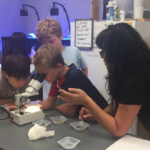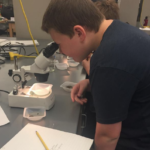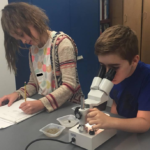Summer SAVY 2018: Session 6, Day 4 – Field Ecology (Rising 5th/6th)
Ahoy parents!
Water day made a splash!
Today we dove into the world of aquatic ecology! Since most of the world’s water is saltwater, we began the day with discussions on ocean circulation and the impacts it has on different ecosystems. We talked about water density and how salinity (or saltiness) affects density and how this impacts ocean circulation on the ocean conveyor belt. As water freezes, the salt comes out of the ice and makes the water around it denser, or heavier, allowing it to sink and drive global ocean circulation. Most importantly, the students really understood how important the ice caps are in this process, and if the poles are warmer, the water does not freeze and therefore the ocean conveyor belt on which many animals rely slows down.
Next, we turned our attention to the water sources in our backyard: freshwater rivers and lakes. We discussed the importance of protecting our watersheds and became even more acutely aware that all of our pollution ends up in surrounding water bodies and ultimately the ocean. Ecologists can monitor the health of aquatic ecosystems through biological and chemical assessments. Students were able to participate in this process firsthand through both observation and testing on different water samples collected throughout Nashville including the Cumberland River, Centennial Park, Shelby Park and Shelby Bottoms.
Students first observed freshwater invertebrates that the instructors collected from local water sources under the microscope. They recorded their observations and used the skills developed in previous days to identify them and their place on the food web. Next, we measured the water quality (pH, ammonia and nitrate levels) in each of the samples that they observed. Using both the chemical and biological data, the students assessed the diversity and quality within these aquatic ecosystems.
Lastly, students were able to make observations from their personalized microbial experiments that were set up yesterday. Ask your child about their specific question and results!
If you want to learn more about your local watershed, visit the Harpeth River Conservancy website, or about ocean conservation, visit the Oceana website.
Tomorrow we’ll learn all about human impact on ecosystems! Start thinking of all of the different ways we can affect our environment!
– The Aqua scientists (Brittany & Stephanie)
Observing Common Tennessee Freshwater Macroinvertebrates


